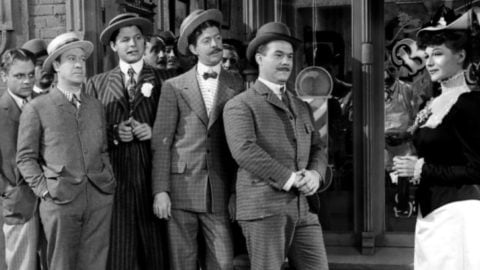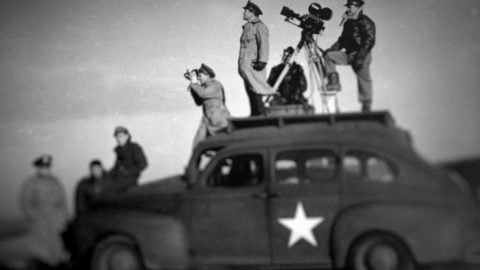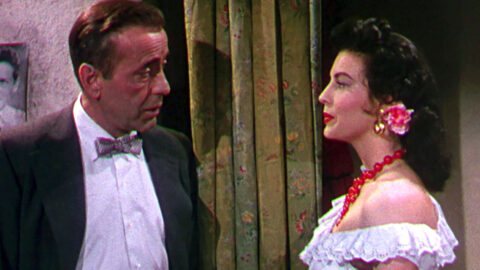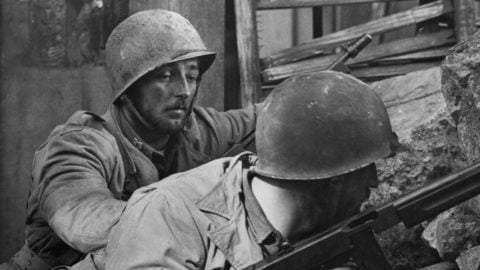TCM Diary: Brian Donlevy x 2
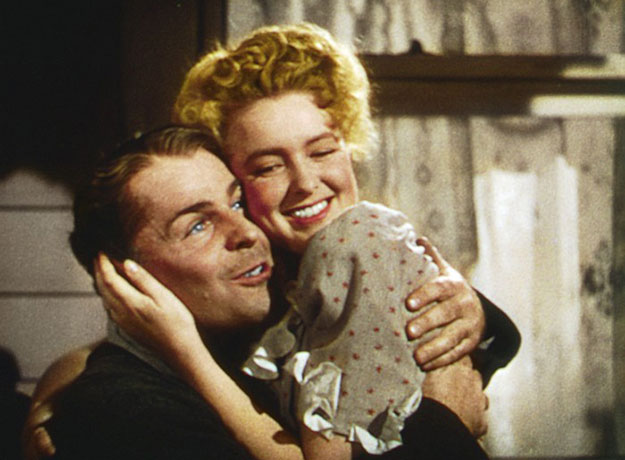
An American Romance
Humphrey Bogart wore platform shoes and a hairpiece; Brian Donlevy added dentures and a corset. For Bogart, when the cameras rolled, all shortcomings vanished and movie magic took over. With Donlevy things were a bit more complicated. The seams were never visible, but he carried himself with the air of a man afraid of being found out. From his hobo-turned-political stooge in The Great McGinty to his sadistic legionnaire Markoff in Beau Geste, you can picture every Donlevy character repeating positive affirmations to himself in the mirror: “Fake it till you make it, lad” (or in Markoff’s case, “…you scum!”).
Those who interpret this as a lack of star quality only half-understand the term. That “Brian Donlevy, Oscar-Nominated Actor” never effaced “Waldo B. Donlevy from Cleveland” made him all the more fascinating to watch. He possessed the virtue of ordinariness, that ineffable factor that keeps the most glamorous stars from being fully persuasive as tawdry, luckless, or unimpressive people. This made him an anomalously relatable leading man during the war years—and inevitably consigned him to noir, the bailiwick of the battered and broken, when the Gables, Fondas, and Stewarts came marching home.
Even critics sometimes fail to grasp Donlevy’s unorthodox appeal. According to Leonard Maltin, King Vidor’s rags-to-riches epic An American Romance “might have been a better film with someone more magnetic than Donlevy in the lead.” Indeed Vidor expressed regret at failing to land his first choice, Spencer Tracy, for the role of Steve Dangos, an illiterate immigrant who rises over half a century from steel mill worker to airplane manufacturer. But while Tracy had etched a riveting portrait of a self-made tycoon a decade earlier in The Power and the Glory, it’s hard to imagine he could play someone as unassuming as Dangos in the early scenes, bungling his first attempt at operating heavy machinery by dumping a steam shovel bucket on his cousin, or someone as abstracted as Dangos is throughout, requiring his sons to explain things to him like the necessity of citizenship and fair labor practices. Tracy’s Dangos would have piled success upon success like mounds of earth from the steam shovel. Donlevy traces a more circuitous course, buffeted by luck, friendly intervention, and obliviousness to (rather than disregard for) obstacles.
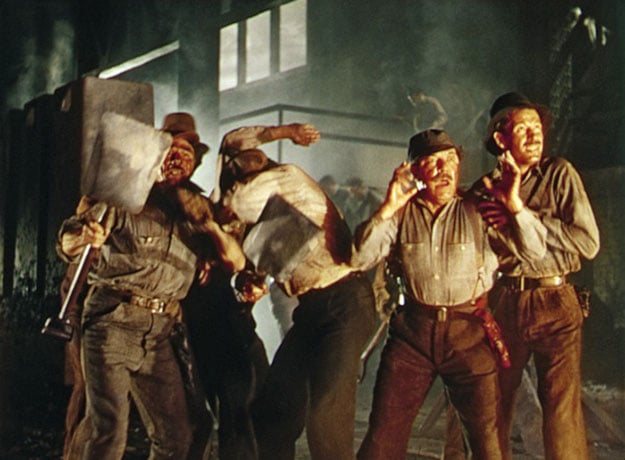
An American Romance
None of this equates the star with mediocrity or indolence. Dangos is committed to making good, and it’s no great leap to connect his conquest of the steel industry with his ironclad faith in his own potential. But his manner does not bespeak preordained triumph—you can easily conceive of another version where he doesn’t marry the inspirational Anna (Ann Richards) or partner with the scholarly Howard (Walter Abel), and his “American romance” consists of attaining a job in a coal mine and at best becoming foreman. Vidor likely envisioned his hero as more of a world-shaker than he seems in Donlevy’s interpretation—the director clearly held a more optimistic view of industry (both senses of the word) in 1944, on the cusp of the postwar boom, than when making The Crowd on the eve of the Great Depression. But Steve Dangos is not Charles Foster Kane, and the film’s title is not ironic: he’s unabashedly smitten with his adopted land, with its promise of social and financial mobility, so instead of depicting a hard-charging usurper, Donlevy evokes an average guy who never loses sight of his good fortune. (To that end, he ably conveys the bashful dread of sounding silly if he writes “I love you” in a marriage proposal, and, a short time later, the goofy elation of a new father greeting the statue in front of the cigar store with a wave.)
Vidor isn’t concerned with the specifics of Steve’s background—we’re never told which country he hails from, leaving Donlevy twisting in the wind, accent-wise—nor does he care overmuch that his hero’s brilliant ideas all involve speeding up production at the expense of safety. Luckily, his leading man brings humor, warmth, and bemused charm that lend the broadly conceived character specificity, and his piercing blue eyes (no enhancers needed) register pain in the rare moments of setback. Shorn of 30 minutes without the director’s consent, the film ends abruptly, but Donlevy’s final expression of weary, hard-won contentment supplies the closure the finished product lacks. He can stop worrying now, stop faking: he’s made it at last.
The actor further prevailed by earning top billing in Fritz Lang’s 1943 ensemble piece Hangmen Also Die!. (Walter Brennan, cast wildly against type as a Czech professor with a parted beard, might’ve wondered why three Oscars hadn’t afforded him that honor.) Hangmen, as much a product of European refugees in Hollywood at the height of World War II as Casablanca, comprised a script by Epic Theatre visionary Bertolt Brecht (billed here as “Bert”) and a score by Hanns Eisler, future composer of the German Democratic Republic national anthem. Ripped from the headlines with heavy dramatic license, it details the aftermath of Czech surgeon Franticek Svoboda (Donlevy) conspiring to assassinate high-ranking Nazi and “Prague Butcher” Reinhard Heydrich. (Last year, the film Anthropoid offered a more factual account of these events.)
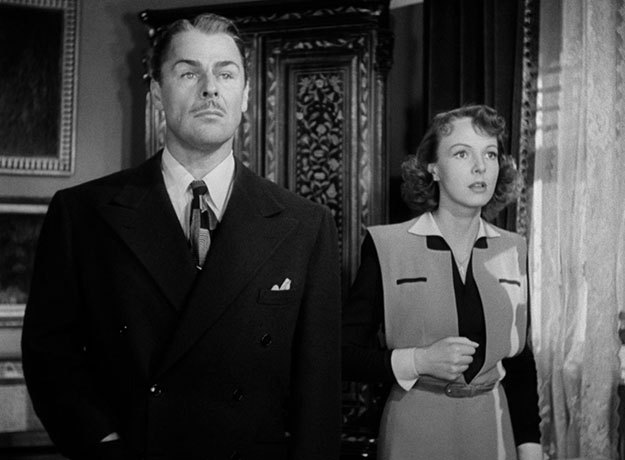
Hangmen Also Die!
With poise and reserve, Donlevy exudes an aura of mystery throughout the first act, before we discover his identity and plight. Evincing conspicuous survival skills (bandaging the wound of his host’s son without missing a beat), Svoboda is a thinking person’s freedom fighter, and the actor’s passive tendencies serve him well when receiving instruction, as he frequently is. We see him reasoning, carefully weighing the merits of incoming advice—a difficult process to convey without words. Brecht’s screenplay is suffused with speeches and Svoboda mostly listens and absorbs, making him that rare thing, then as now: a man of conscience, attuned to ideas as well as actions.
Though sold as a topical thriller, Lang’s true subject in Hangmen Also Die! is the effect of fear on a community—namely how the Gestapo and its collaborators attempt to ferret out the assassin, and members of the Czech resistance betray one another (or don’t) for self-preservation and favors. It’s a cerebral, atmospheric work with the trappings of a B-movie (including a cast of character actors, James Wong Howe’s high-contrast lighting, plenty of skullduggery with monogrammed lighters and lipstick, and a lurid title coined by a production secretary for a $100 prize). Donlevy’s role isn’t much on paper; the juicy parts are Gene Lockhart’s craven informant (a reprise of his Casbah stoolie from Algiers) and Reinhold Schünzel’s fey, knuckle-cracking interrogator (a high-camp turn worthy of Ernest Thesiger). Svoboda’s watchful, recessive mien anticipates James Mason’s endangered resistance fighter in Odd Man Out, and his need to blend into the collective for safety’s sake required an actor who could do just that. Once again Donlevy’s normalcy was his secret weapon. The hair and teeth may have been borrowed, but the authenticity was all his own.
An American Romance airs on July 3 and Hangmen Also Die! on July 5 on Turner Classic Movies.
Steven Mears received his MA in film from Columbia University, where he wrote a thesis on depictions of old age in American cinema.



